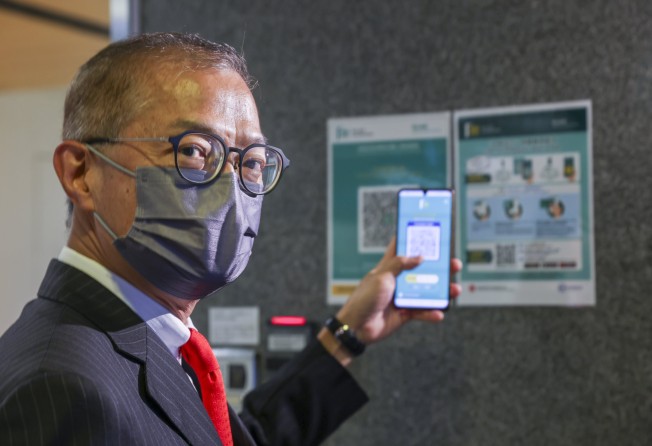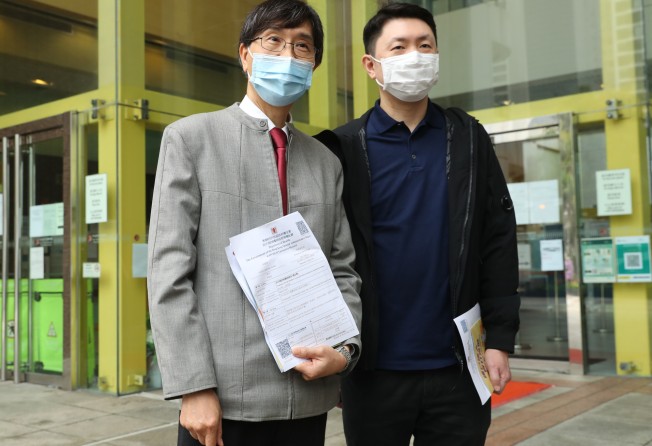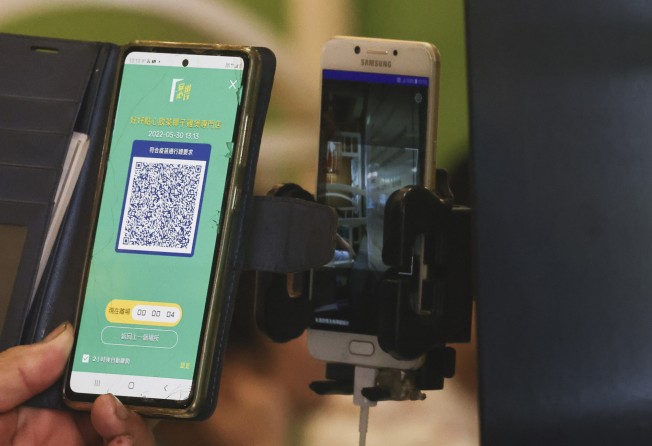
Coronavirus: health chief to weigh experts’ call for Hong Kong to ease curbs and build natural immunity through infections; city logs 3,762 cases
- Secretary for Health Lo Chung-mau acknowledges suggestions from HKU experts, two of whom are government advisers, but sounds note of caution
- He also reassures public on privacy protection in proposed health code system

Hong Kong’s health minister has said he will consider suggestions by experts to ease pandemic curbs while building immunity among the local population through vaccination and Covid-19 exposure, warning however that “policymaking does not depend on a certain theory”.
Secretary for Health Lo Chung-mau pointed out that the vaccination rate for the elderly and children under three remained relatively low, adding that the capacity of the city’s medical system would have to be considered in relaxing rules.
Lo was responding on Saturday to four University of Hong Kong pandemic experts, including two government advisers, who called for authorities to move towards population immunity via a combination of vaccination and natural infection, allowing a return to normalcy despite a recent surge in caseloads.
They urged the gradual lifting of social-distancing measures for some degree of exposure to Covid-19 to build immunity among residents before winter, while the city waited for Omicron-targeted booster jabs.

Their recommendations were based on an earlier data model that 4-5 million people out of the city’s 7.4 million population had at some point been infected.
Hong Kong on Saturday confirmed 3,762 new coronavirus infections, including 229 imported ones, and one related death. The number of cases marked the fourth consecutive day the total exceeded 3,000.
The city’s Covid-19 tally stands at 1,290,596 cases, with 9,433 fatalities related to the virus.
As of Saturday, 89.2 per cent of the population aged three or above had been fully vaccinated, with 65.8 per cent having taken a booster shot. But the inoculation rate among the elderly, who are most vulnerable to Covid-19, has been lagging, with only about 37 per cent of those aged 80 and above having received their third dose.
“We cannot solely rely on an immunisation barrier or the concept of hybrid immunity and say we need not do anything. The government, as an organisation, has the paramount responsibility to look after the life and health of the entirety of the Hong Kong population,” Lo told a radio show, adding that “policymaking does not depend on a certain theory”.

The four medical professors and experts behind the call are Ivan Hung Fan-ngai, David Christopher Lung, Siddharth Sridhar and Yuen Kwok-yung. Hung and Yuen are pandemic advisers to the government.
In a paper the quartet wrote and which was published on the university’s website on Friday, they also called for a change in pandemic strategies, such as prioritising opening to the world, doing away with hotel quarantine for arrivals and allowing home isolation.
At present, overseas arrivals are required to spend seven days in quarantine at a designated hotel. Hong Kong still retains some of the toughest Covid-19 control measures in the world, despite other places such as Singapore, Europe and the United States opening up to quarantine-free travel.
“The home and hotel quarantine could eventually be replaced by daily real-time polymerase chain reaction [PCR] testing with a bracelet tracker for seven days, and another test on the 10th day. Cross infections do occur in quarantine hotels since they are not hospital isolation rooms,” the experts said.
“Imported cases from travellers do not make a difference to the local epidemic situation. As all returning travellers are required to be fully vaccinated, they would not place undue burden on our hospital system even if they have Covid.”

Lo on Saturday expressed worries that the surge in daily infections would exhaust medical resources and affect patients with other severe illnesses, as occupancy of Covid-19 patients at public hospitals had crossed 1,100 beds, from 400 early last month.
With serious cases also surging from about 10 in early June to nearly 50 every day at present, Lo warned a quarter of healthcare services at the city’s 42 public hospitals might be affected. He said infection numbers could double in two weeks based on the existing trend.
As of noon on Saturday, the occupancy rate for isolation facilities remained low. Among the 1,510 quarantine units at four designated centres, 102, or 6.7 per cent, were taken. At the Penny’s Bay camp on Lantau Island, only 35 out of more than 1,000 rooms were being used.
Patients are allowed to isolate at home if they have a separate bedroom and bathroom.
Kwok Kin-on, an assistant professor of public health at Chinese University, said he believed the suggestions represented a consensus within the city’s medical community.
“I think the key point is to let the fully vaccinated individuals get infected as long as the public health system can absorb the pressure,” he said. “But the point in question is when we execute it, how we can handle the arrival of new variants and whether we have enough time to inoculate the elderly so that they can weather the approaching new waves.”
When asked what Hong Kong’s reinfection rate had been since June, the Centre for Health Protection’s Dr Chuang Shuk-kwan said she did not have the figure, but the rate in homes for the elderly was not high.
Authorities last Monday backed a two-colour health code proposal similar to the system in mainland China, centred on curbing infections by tracking residents’ movement.
Lo assured the public that Hong Kong’s version of the code, to be embedded in the government’s risk-exposure app currently used by residents, would have no tracking function.
“For the majority of the people, there is no need to have any change in the ‘Leave Home Safe’,” he said. “There will not be any increase in restrictions, and there will not be any tracking function.”
A red code will identify those diagnosed with Covid-19 through a PCR test at a government-certified testing centre, while a yellow code will be issued to uninfected overseas arrivals undergoing quarantine.
The proposed system has stirred public concern that authorities would make use of the app to record and dictate residents’ daily movements through digital footprints.
Additional reporting by Edith Lin